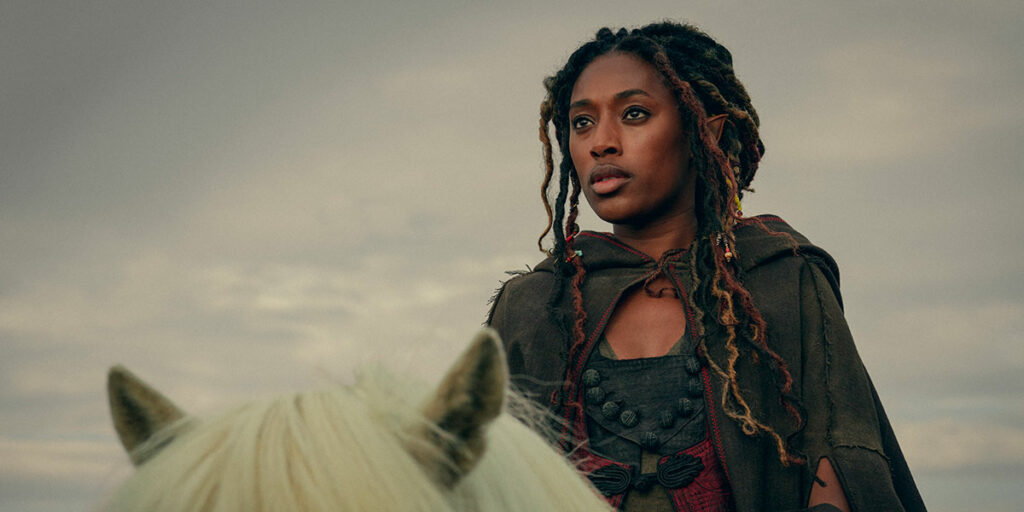It may not be for everyone, but Netflix’s The Witcher: Blood Origin is a solid companion piece for anyone waiting for the return of The Witcher series.
The state of The Witcher as a franchise on television is in a weird position at the moment. A good amount of book readers were not happy with the changes being made to the source material in The Witcher’s second season. Earlier this year, the hype for the brand new prequel series wasn’t huge, but it certainly wasn’t dead either. Things got complicated, though, when in late October of 2022 it was announced that Henry Cavill (Enola Holmes 2) would be exiting the show after the third season being his last appearance as Geralt of Rivia.
So, as you can imagine, this left most fans confused, angry, and disappointed with the sudden turn of events. You might ask yourself: why dedicate your time to a world that even its lead actor doesn’t have much faith to stay on board? It’s kind of an unfair question to ask when there are still a variety of talented people working on these shows behind and in front of the camera. Plus, the series isn’t bad. It’s got issues, but fans often overreact when details are changed from the page. As you can see, The Witcher: Blood Origin has way too many obstacles to climb. Can the prequel series prove itself amongst the behind the scenes drama?
Netflix’s The Witcher: Blood Origin marks a new chapter in the fantasy series and it takes us twelve-hundred years back to explore a Continent without witchers. We follow seven outcasts who band together to fight against a rising empire that took everything from them. Their journey leads to the creation of the first prototype witcher in a conflict that culminates in the Conjunction of the Spheres. An event known for merging the worlds of monsters, men, and elves into one.

What works in the prequel really does work. The cast helps sell the high stakes that often don’t feel as urgent as they’re meant to, though it takes some time for the actors to feel comfortable in their characters’ shoes. Laurence O’Fuarain’s Fjall is written as your typical warrior hero and O’Fuarain is having the time of his life playing that role. Sophia Brown (The Capture) as Elie is the standout here, though. She is the heart of the show and brings a much necessary sense of emotion that we don’t get from most of our characters.
Michelle Yeoh (Everything Everywhere All At Once) is having a hell of a run as she is currently receiving support from all corners during this awards season. What we get from her in the series is certainly good, but there is not much depth to her role unfortunately. Scian is mostly portrayed as a cool heroine, which is fine on paper since that is how Fjall is presented as well. What is disappointing is that we never get to clearly explore Scian’s headspace. We’re constantly told what she thinks, but not necessarily shown. It comes off as a waste of Yeoh’s talents.
That’s the problem with many of our main players. They’re given plenty of screentime, yet not enough somehow. It isn’t always an issue of screentime, but rather how you use it, and The Witcher: Blood Origin definitely suffers from this. At times you feel like you should be more invested in our characters’ actions, but you’re often not. Which is an odd thing to say when you do want to learn more and spend time with them, but the way it is handled is not very engaging.
Lenny Henry (The Lord of the Rings: The Rings of Power), Jacob Collins-Levy (The Liberator), and Mirren Mack (Sex Education) do their best trying elevate what’s on the script, but as antagonists they aren’t really intimidating. The show has a tonal problem in the sense that one storyline will take itself very seriously with fantastical elements, while the other has an adventure, B-movie feel to it and both just don’t mesh well enough. That issue becomes quite obvious with our villains because it makes their conversations feel like homework. It’ll be interesting to see how those storylines play out for the general audience, because one can imagine them getting lost really quickly with the lore being explored here.
Once the first two episodes are done and we move on to the second half of the season, the series does take a breather to take things a bit slow and allow us to live with our protagonists and antagonists. There’s a particular scene with Ellie singing to the group of outcasts that is just beautiful and magical to watch. It is moments like those that make The Witcher: Blood Origin worth watching.
There are fun action set pieces, too, that do the most with the show’s budget. One that takes place in a claustrophobic tower makes for an entertaining fight scene to behold. In that way, The Witcher: Blood Origin continues the tradition of having stellar action, as The Witcher has established with its two seasons. Another notable hero that delivers great comedic timing and action is Francesca Mills (Pistol) as Meldof. Her charisma is intoxicating and it is a joy to see anytime she pops up on the screen.
We’ve talked about the show’s writing for particular characters and storylines, but we really need to look at The Witcher: Blood Origin’s structure to see where the series might have lost its full potential. Watching the prequel, you’ll find yourself feeling as if you were seeing an extended movie. It’s structured as a TV show, although it doesn’t feel so. Things are way too rushed, making events such as the making of the first witcher and the Conjunction of the Spheres feel like after thoughts when it should have left a bigger impact. The series either needed to be approached as a feature length film with a three-arc structure, or be an actual show. Instead we have something in between that doesn’t always work.
Issues and all, The Witcher: Blood Origin remains an entertaining limited series to watch. It’s a nice companion piece that will keep you engaged in the world of the Continent while we wait for what will be Henry Cavill’s final performance as our titular witcher. Where will this franchise go from here? Only time will tell. For now, we can enjoy getting lost in this fantasy universe that is bloody, yet a ton of fun to spend your time in.
The Witcher: Blood Origin premieres globally on Netflix December 25, 2022.

